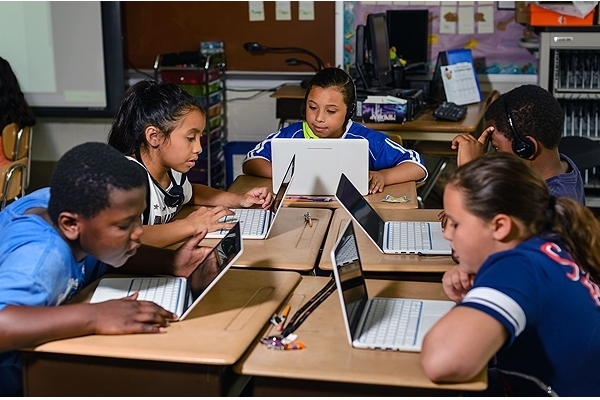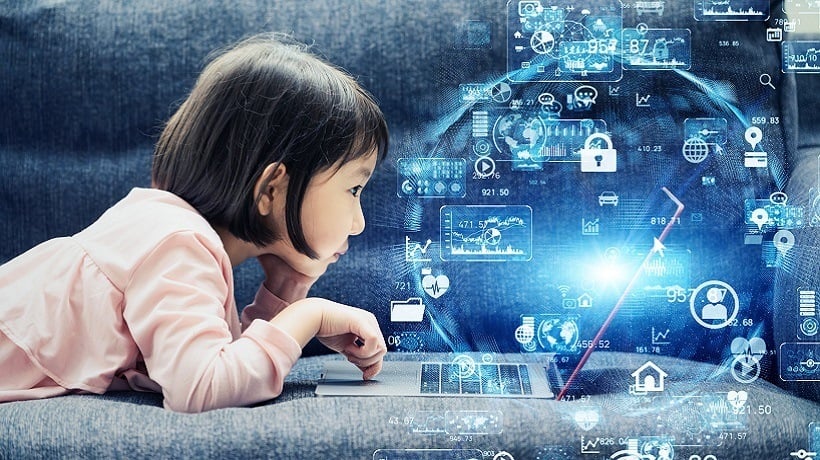The integration of new technologies in the classroom is not a new phenomenon. From the introduction of television and radio to the digital age when computers were put in every school, the education industry has needed to evolve with the transformation of the rest of the world. With the global Covid-19 pandemic, digital transformation in education accelerated out of necessity rather than desire, and there is no going back. The question is: is this a good thing?
Children are now improving their digital literacy at a very young age which prepares them for the digital world they will enter as they get older. Using technology for educational purposes can be exciting for children and make them engage with the content more, as well as understand it in a way they may not have in a traditional setting. This familiarity with technology also encourages students to learn about topics they are personally interested in outside of school and develop skills at a young age that will propel them into a successful career.
On the other hand, children are now required to begin learning how to use a computer at school in Kindergarten, and will continuously need to access the internet practically every day throughout the rest of their academic career. This is creating a familiarity with devices both at school and home that is causing children and pre-teens to become addicted to the internet. Children are becoming less attentive and less social at school which is already leading to noticeable behavioral issues and an increase in mental illness.

Asking a Primary Source
I decided to talk to my parents about some first-hand accounts of the effects of technology in education. My mom is an elementary school counselor in Gwinnett county and my dad is a middle school counselor in Gwinnett county as well. According to my mom, every student has their own Chromebook that they are assigned and able to use in class as well as take home to work on assignments. Gone are the days of walking as a class to the computer lab and learning how to use a Word Doc. Nearly all assignments, tests, quizzes, and writing are done online. My dad mentioned that a benefit of digitizing education is that now, students can read instructions, lesson outlines, and watch preparation videos at home, so teachers can use more class time for engaging activities like games, activities, and small group discussions. Teachers are able to provide more resources to students to deepen their understanding of concepts and appeal to the learning styles of each individual student. My parents also mentioned that the ability to attend school online has created an opportunity for students who were previously struggling in a regular school environment to continue the education they deserve in an environment suitable for them. In my mom’s elementary school alone, there were at least 50 kids who did not return to fully in-person classes after the pandemic who now participate in a hybrid school schedule. This shows that the digital transformation to online learning in education has proven to be preferable to some children than traditional learning.
While there are exceptional positives to the use of new technologies in education if used correctly, my parents also had great points as to how the constant use of technology at school and home is affecting kids in noticeable, negative ways. When students first came back to school in person after the pandemic, my mom remembers noticing that many students, especially the younger ones in kindergarten through second grade, did not know how to act around other people and were extremely uncomfortable in a public setting. While this observation was probably greatly due to the extreme isolation forced on people from Covid, both of my parents continue to see similar effects to this day. Kids are becoming increasingly unable to build natural, face-to-face relationships with their teachers and peers due to their comfort with communicating online. In middle school, my dad has noticed that the behavior of the students has gotten progressively worse over the last decade because kids are much less attentive and unable to focus on one thing for an extended period of time. It is proven that internet addiction has a negative effect on people in general, especially children and pre-teens. According to The Children’s Bureau, 20% of children aged 13-18 will experience mental illness before adulthood, 11% being mood disorders, 10% being behavior and conduct disorders, and 8% being anxiety disorders. While not all mental illness stems from technology use, the consistent and premature exposure to it that children experience nowadays has been linked to an increase in mental health issues.

The Bottom Line
One thing we do know is that computers in the classroom are not going away and neither is online schooling. This digital transformation of technology in the classroom has made communication between teachers and students so much easier as well as inspired a new wave of creativity for educators. It has catered to the needs of students with learning styles or impairments that make coming to school difficult. Kids are incredibly tech-savvy and have the ability to expand their personal knowledge and skills. And a bonus is that we are saving some trees by limiting the amount of paper used. I think it is important that children learn computer skills and are taught digital literacy since they need to be skilled in those areas as they grow up and technology advances. When used for the right purposes, this transformation is appreciable. However, requiring children to use the internet at school and at home on a daily basis is encouraging a generational addiction to the digital world that is becoming increasingly noticeable, yet the long-term effects are frankly unknown.